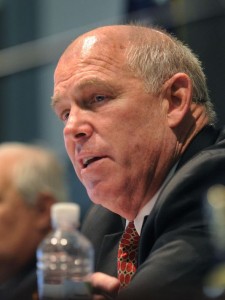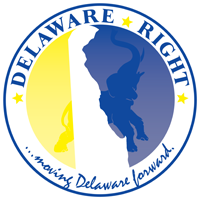 Delaware House Speaker, Rep. Pete Schwartzkopf has proposed HB 333, a bill intended to clarify language within Article VIII of the Delaware State Constitution. Language that in my opinion needs no clarification.
Delaware House Speaker, Rep. Pete Schwartzkopf has proposed HB 333, a bill intended to clarify language within Article VIII of the Delaware State Constitution. Language that in my opinion needs no clarification.
The bill would severely limit an incorporated town’s ability to impose, and raise taxes and fees within their incorporated limits. Rep. Schwartzkopf believes that the bill merely reinforces language already in the state constitution. In a quote in the News Journal, from a hearing last week, Rep. Schwartzkopf is quoted as saying, “No tax … may be imposed or levied except pursuant to an Act of the General Assembly, adopted with the concurrence of three-fifths of all members of each House.”
What Article VIII, sec. 10, sub sec. (a) actually says is, “The effective rate of any tax levied or license fee imposed by the State may not be increased except pursuant to an act of the General Assembly adopted with the concurrence of three-fifths of all members of each House.”
Notice the words, “imposed by the state”. Clearly this section is not intended to restrict towns and other incorporated municipalities from tending to their own business of how to tax the citizens who “choose” to live within their town limits. This section of Article VIII clearly is an instruction for how the state is required to go about raising any tax it has imposed. The language says that to raise a tax or fee that the state has imposed, requires a three-fifths vote of the General Assembly, it is a stretch of common sense, and reason to think otherwise.
Rep. Schwartzkopf seems to be guilty of selective reading of the state constitution in more ways than one. Not only did he leave a few words out of his interpretation of Article VII, sec. 10, sub sec. (a). He has also failed to read the document as a complete document, choosing instead to selectively read the parts that serve his agenda. And some would never believe that Mr. Schwartzkopf and Sheriff Jeff Christopher would ever have anything in common.
It seems that Rep. Schwartzkopf completely ignored section 1 of Article VII, in which in the first paragraph it states, “All taxes shall be uniform upon the same class of subjects within the territorial limits of the authority levying the tax, except as otherwise permitted herein, and shall be levied and collected under general laws passed by the General Assembly.”
“Territorial limits of the authority levying the tax”. Sounds to me, like once again, the framers were not restricting the powers of the towns, but merely stating how they were to go about taxing.
So why would Rep. Schwartzkopf be so interested in restricting the powers of towns to impose taxes and licensing fees? Well some have supposed it may have something to do with the fact that a local businessman in Mr. Schwarztkopf’s district, who lives in Dewey, may have something to do with it.
That would be Alex Pires a wealthy, powerful, D.C. lawyer who is currently suing Dewey Beach over the town’s licensing fee practices. You see Dewey has no property tax, and obtains all of its revenue from fees.
Mr. Pires has a reputation of getting what he wants, if he can’t buy it, then he simply sues it until he owns it. Unfortunately for Mr. Pires his case was dismissed by The Court of Chancery in December, concluding that the Town of Dewey is empowered in their charter, approved by the General Assembly, with broad taxing authority. Mr. Pires has stated that he will appeal to the state Supreme Court.
Now of course Rep. Pete Schwartzkopf has denied that the Pires situation has anything to do with HB 333, even though the synopsis of HB 333 refers to the Chancery decision. And why wouldn’t we believe that? After all, how much influence can a wealthy, powerful lawyer from D.C., who owns half of Dewey Beach, have over a legislator running for re-election this year?
The state constitution is clear on this issue, that is unless you choose to ignore a few key words, or whole sections of the document. Towns have every right to impose fees and taxes upon the people who “choose” to live, and do business within their incorporated town limits. For the General Assembly, or should I say Rep. Schwartzkopf, to try this end run around the document, is like the federal government attempting to say that Delaware has no right to imposed taxes without the permission of the federal government.
We have come to expect a more subtle modus operandi when legislators attempt this type of end around, this however is a blatant disregard for both the state constitution, the sovereignty of incorporated towns, and the citizens of the state as a whole.
Rep. Schwartzkopf should pull HB 333 from any consideration, and let Mr. Pires live or die in the court system where this issue should be decided, not by the heavy hand of the Legislature.


Language that in my opinion needs no clarification.
Everything in the Delaware Constitution needs legislative or judicial ‘clarification.’ Such as “…the Sheriff(s) shall be the conservators of the peace in the counties…”
Who needs plain English? “Clarification” is so much more intelligible.
The can of worms has been opened- now, live with it.
Nice try Rick, two different issues. In the case of the sheriff you and others have tried to inject meaning into a vague phrase, in the case of Rep. Schwartzkopf’s attempt to strip the towns of powers specifically enumerated he is trying to turn specific meaning into a vague phrase.
Article 8 Section 11 never mentions municipalities. In other sections of Article 8 municipalities and even counties are mentioned for various reasons. This is nothing more than an end run around elected councils because one actually won a court case. Perhaps if this passes the towns should actually think about surrendering their charters and let the state run the show. They are doing such a good job with the responsibilities they have now.
Taliessin, the idea of surrendering their town charters and letting the state run things is actually the real fear here. Because no law exist in a vacuum. If the state can tell towns when they can’t institute a tax or fee increase, can they not also tell town when they “MUST” institute tax and fee increases regardless of what the town councils or the citizens may think?
Nice try Rick, two different issues..
Maybe to you they’re “two different issues.” To me, “clarifying” the plain language of the Delaware Constitution is tantamount to amending the Delaware Constitution.
In your original post, you wrote”
The state constitution is clear on this issue, that is unless you choose to ignore a few key words, or whole sections of the document.
Well, how can you be more “clear” when you state “…the Sheriff(s) shall be the conservators of the peace in the counties…?” Of course, you can always “ignore a few key words”…right?
HFS Rick, nobody is ignoring the words COP, now show me where, “IN” the constitution they are defined. You can’t. You and Sheriff Christopher and all of the lock-step supporters have to go “OUTSIDE” of the state constitution to attempt to define those three words in a manner that serves your purpose.
However in this case with HB 333 the words are already within the state constitution, no need to look outside of it. The only way it works is if you remove those words.
Now if you would kindly remove your head from your butt, it is not a hat.